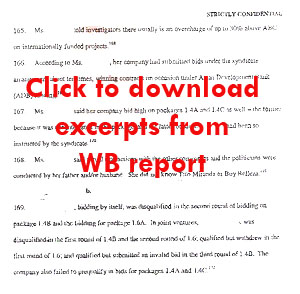By ELLEN TORDESILLAS
 THE World Bank has in its possession documents of bribe payments to politicians in connection with public works projects it is funding in the Philippines.
THE World Bank has in its possession documents of bribe payments to politicians in connection with public works projects it is funding in the Philippines.
A report of the bank’s Department of Institutional Integrity (INT) on the collusion among contractors who bidded for the National Roads Improvement and Management Project (NRIMP) said that “a winner paid off politicians for election campaign funds and paid direct bribes to senior DPWH (Department of Public Works and Highways) officials. He provided documentary evidence of some of those payments.”
(VERA Files is making available excerpts from the report but has removed the identities of the witnesses and footnotes in the report for their protection.)
The results of the World Bank investigation paint a picture of widespread corruption that reaches up to the highest level of government. A Japanese contractor recalled his meeting with First Gentleman Jose Miguel Arroyo and then administration Sen. Robert Barbers. Barbers died in December 2005.
The Japanese contractor said Barbers made it clear to him that “money would have to be paid as high as the president, senior government officials and politicians in order to do any further business in the country.”
The World Bank last month blacklisted seven firms and one individual for collusive practices. E. C. de Luna Construction Corp. and Eduardo C. de Luna, owner and sole proprietor of the firm who is linked directly with Mike Arroyo, were both debarred indefinitely.
Also blacklisted were China Road and Bridge Corp., China State Construction Corp., China Wu Yi Co. Ltd., China Geo-Engineering Corp., Cavite Ideal International Construction and Development Corp. and CM Pancho Construction Inc.
A number of the resource persons testified on the closeness of de Luna and Arroyo. One contractor said, “Mr. (Tito) Miranda and Mr. (Boy) Belleza both actively work to manipulate bidding… Mr. De Luna is ‘behind’ Mr. Miranda, and the husband of Philippine President Gloria Arroyo is ‘behind’ Mr. de Luna.”
One contractor said the payoff is “equal to between 15 (and) 20 percent of the total value of the contract.”
In recent years the process payoff has changed, another contractor said. “Now a percentage of the advance payment goes to the syndicate leaders who split the payment 50/50 between the politicians and the arrangers (who pay the losing companies),” he said.
Payments are made in cash. “Company books do not reflect any of these payments in any event, because the books are faked to avoid taxes,” the contractor said.
Deals are usually cut in five-star hotels. Mentioned several times in the report is the Manila Diamond Hotel on Roxas Blvd., but one contractor said meetings now “occur elsewhere” as well.
The INT investigation uncovered evidence of a major cartel involving local and international firms bidding on contracts under the first phase of NRIMP or NRIMP-1. INT closely analyzed the procurement process the firms participated in and conducted numerous interviews before closing the investigations and initiating sanctions proceedings against the entities.
One contractor said the standard operating procedure worked this way: First, a congressman anoints the winner prior to the bidding by identifying the winner to the district engineer.
Contractors pay 15 to 20 percent of the contract to the congressman who sponsors them. The winning bidder gives the losing bidder 1 to 3 percent of the contract value while government officials share in another 2 to 3 percent.
The winning contractor who supplied the World Bank with evidence of some of the payments he made to politicians and DPWH officials said he obtained fake receipts to balance out any payment discrepancies and avoid bookkeeping problems.
The contractor said his submissions to the Bureau of Internal Revenue did not reflect his company’s true financial condition. But this hardly worried him because he “was also bribing officials of the BIR.”–With Yvonne T. Chua